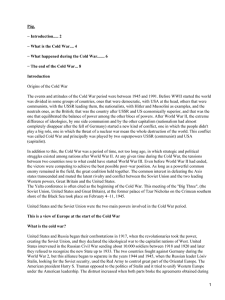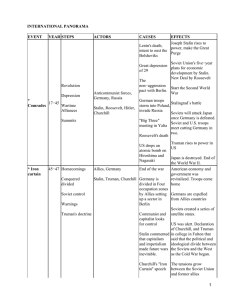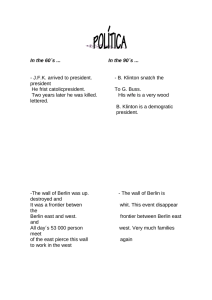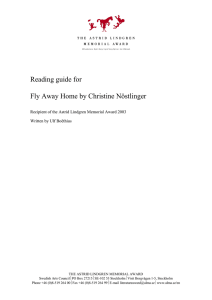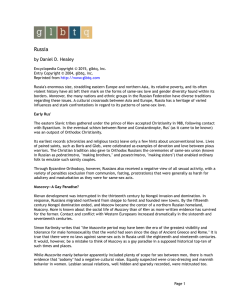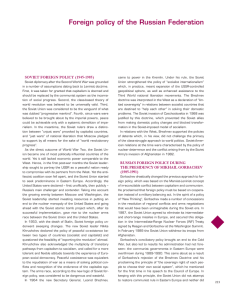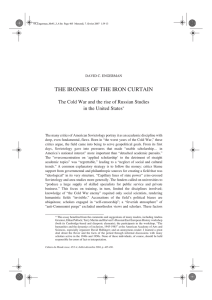why the soviet union chooses to insulate itself
Anuncio
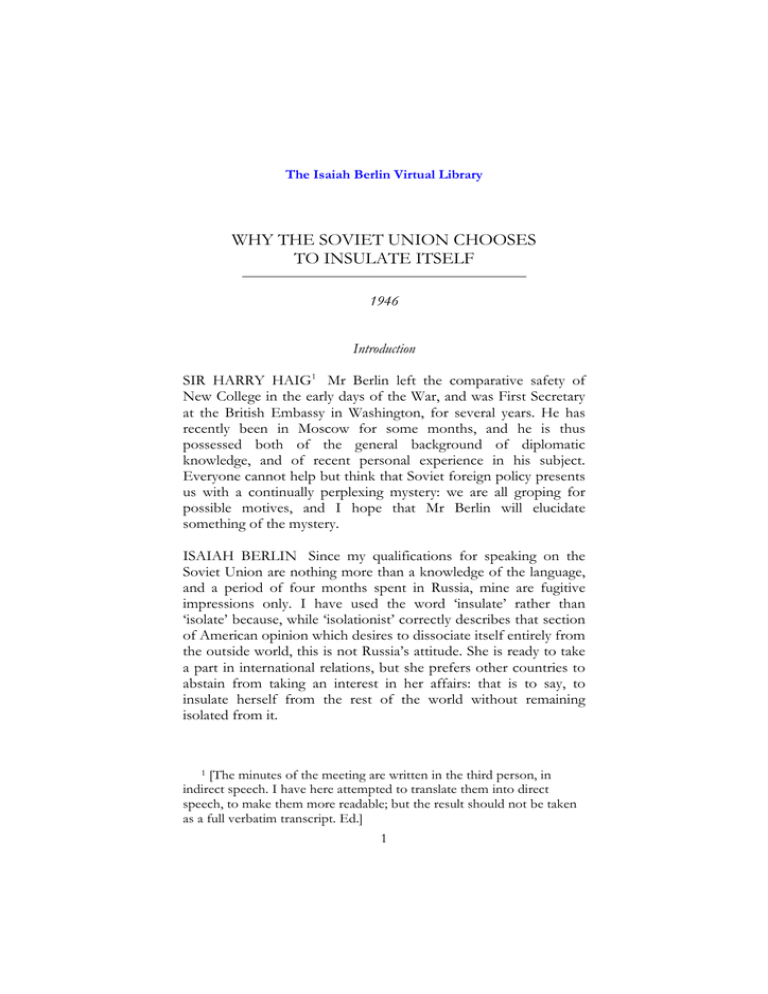
The Isaiah Berlin Virtual Library WHY THE SOVIET UNION CHOOSES TO INSULATE ITSELF 1946 Introduction SIR HARRY HAIG1 Mr Berlin left the comparative safety of New College in the early days of the War, and was First Secretary at the British Embassy in Washington, for several years. He has recently been in Moscow for some months, and he is thus possessed both of the general background of diplomatic knowledge, and of recent personal experience in his subject. Everyone cannot help but think that Soviet foreign policy presents us with a continually perplexing mystery: we are all groping for possible motives, and I hope that Mr Berlin will elucidate something of the mystery. ISAIAH BERLIN Since my qualifications for speaking on the Soviet Union are nothing more than a knowledge of the language, and a period of four months spent in Russia, mine are fugitive impressions only. I have used the word ‘insulate’ rather than ‘isolate’ because, while ‘isolationist’ correctly describes that section of American opinion which desires to dissociate itself entirely from the outside world, this is not Russia’s attitude. She is ready to take a part in international relations, but she prefers other countries to abstain from taking an interest in her affairs: that is to say, to insulate herself from the rest of the world without remaining isolated from it. [The minutes of the meeting are written in the third person, in indirect speech. I have here attempted to translate them into direct speech, to make them more readable; but the result should not be taken as a full verbatim transcript. Ed.] 1 1 S O V IET SEL F- IN SUL AT I ON I will not go over the general background: no doubt my audience is familiar with eighteenth- and nineteenth-century Russian history, and will know the general reasons for Russia’s mistrust of the West: that she has never for long been a part of Europe, has not mingled frequently with the European nations, and, in consequence, feels dangerously inferior. It is interesting to note that, with the possible exception of Turgenev, there is no great Russian writer who did not suffer from xenophobia, amounting at times to acute hatred of the West. There is a permanent neurosis resulting from this uneasy position which Russia feels she occupied – ‘Scythians’ belonging neither to East nor West. Economic backwardness is generally advanced as the main reason for her inferiority complex, but I wonder if it is perhaps more complicated than that. One peculiar cause of Russia’s disquiet about the West, which I have noticed in talks with Soviet officials and journalists, is the method by which they themselves account for the traditional Russian attitude towards Europe – and towards Great Britain in particular. Her present-day attitude is an inheritance from the only possible explanation – in Russian eyes – of the immense nineteenth-century expansion of imperial Britain. How, the Russians ask, did so small a country manage to spread itself over the face of the earth? There can be only one answer; within the boundaries of this small island there is a tremendous concentration of intellect and energy serving a long-term, Machiavellian plan. For the Russians, regarding themselves as clumsy giants, born muddlers gifted with great emotional resources, this theory has gradually hardened into fact – they assume that every thoughtless British step is part of some long-term scheme: if it is not so, they argue, how can Britain have acquired such power? One may remark, with some amusement, that this is far from commonly the case; ours is a hand-to-mouth policy, operating by fits and starts, and often an absent-minded one at that. Yet into this theory, this hypothetical pattern of long-term policy, the Russians dovetail each piece of evidence. Forced into so unnatural a schema, British policy is bound to appear malevolent and, naturally, counter-measures have to be taken by the Russians: from Russian counter-measures spring British counter-measures, and so the vicious circle of misunderstanding continues. The ‘long-term plan’ theory of British policy is strengthened by Marxism, which leads officials to interpret British motives in terms of conscious or 2 S O V IET SEL F- IN SUL AT I ON unconscious class warfare. A fantastic interpretation of the case of Hess as an elaborate piece of double-crossing by Mr Churchill convinces them of superior British cunning – yet if one asks them for proof of any such theory they can produce no concrete evidence, but will merely say that the British deceived others and themselves. The British do not understand the inexorable governing laws of their history, and are mistaken in imagining that they obey ephemeral impulses. British policy obeys the laws of capitalism hurrying to its doom. Any attempt to refute this shows the author to be a fool or a knave. It is difficult to shake the Russians out of this hypothesis, since, whichever way the evidence points, it is supported equally by positive and negative instances. It is impossible to wonder at the Russians for taking countermeasures, once the complete acceptance of these fixed ideas has been understood. I have heard it said that the Russians have ceased to be conscious Marxists and have become nationalist and opportunist. I do not agree: there is still a universal adherence to a very crude and simple form of Marxism – there might be a change of tactics, perhaps, but there is no change of strategy. This, I feel, is an important fact, because of the fundamental beliefs involved in an acceptance of Marxism – if the rulers of a nation believe in the inevitable integral2 conflict of capitalism, that belief will have its effect on the nation’s foreign policy. Russia’s attitude towards Britain is not strictly one of suspicion – this is an illusion on the part of the British. There are plenty of shrewd people in the Soviet Union who know the British well. ‘Suspicion’ implies that closer acquaintance will bring warmer feelings. This assumption springs from national vanity: there is no reason to think that when the Russians know our true face (and vice versa) they may not distrust it even more than they do now. Suspicion feeds on ignorance, disapproval, which is what many Russians feel, not on knowledge. The more they know the less they forgive. It may as well be faced that they think a non-capitalist world society will in time become a reality, and that this is a fact which is bound to drive other countries against them. I regard Soviet foreign policy as in this sense ideological – I doubt whether the possession, in itself, of Trieste, for example, or the Straits is a basic point; it involves the assumption that Russia wants these places for military purposes. This, I think, is not quite so – their particular demands vary with 2 [‘internal’?] 3 S O V IET SEL F- IN SUL AT I ON the regime that is in control of these areas. The Soviet Union still regards Italy as a potentially pro-Fascist country, and is therefore urgent in her demands that Trieste should go to Yugoslavia: for the same reason she raises difficulties with Turkey by way of ‘Armenian’ or ‘Georgian’ claims. There is one point I want to make: the security of the Russian system is uppermost in the Russian official mind; it is not a question of frontier security but of something more intangible. The Russians may be cynical about the means with which they achieve these ends, but they are not cynical about the ends themselves: they really do believe in the basic principles on which their State is founded, and while other systems exist which might compete with theirs, and until their principles are generally accepted, they will remain nervous and security-conscious. It is thus a little simple of the British Government and public opinion, I think, to imagine that the Russians can react to the difference between a liberal and illiberal Britisher, and that by sending to Moscow people who might be supposed to be sympathetic to the Soviet Union any real understanding can be achieved. To them the British are capitalists, and vastly cunning; the subtle distinction between broad and narrow views means no more than that between right-wing and left-wing Communists does to us. The Soviet Union is most usefully viewed as an educational establishment. It is not a prison – that is a distortion. Its citizens feel much as boys at school, and the main purpose of the school is to educate the Russians into equality with the West as soon as possible. The main point, sometimes admitted by officials, is that the Russians are half barbarian, and they have to be made conscious of Western civilisation and civilised values. This cannot be done by kindness in a school of two hundred million pupils. It is the same principle as that of the old headmaster: to make men out of callow boys you beat them at regular intervals; otherwise they will be done down by their maturer fellows. The simplified form of Marxism held by most ordinary people in the USSR is extraordinarily like public school religion, actively believed in by a small minority, passively held by the rest. The Soviet Press may be said to pursue aims similar to those of the school magazine, and, to pursue the analogy further, visitors to the Soviet Union are treated much as strangers found loitering round a school and talking to the boys. As the stranger is not necessarily suspected of warping a boy’s mind, so the visitor is not always 4 S O V IET SEL F- IN SUL AT I ON suspected of spying and plotting – but of wasting the boy’s time by distracting his attention. To talk of other standards, political or cultural, to a Russian is thought to deflect him from his purpose and waste his energy. Taken in its context, this is a rational attitude for the Soviet authorities to assume, when they are trying to build up a new society in an imaginary race against time and in a ring of jealous enemies. It is an attitude relaxed, perforce, during the War, but lately it has been tightened up. The West was surprised at the wartime relaxation of security, but the position was analogous to a Field Day for the school OTC. School regulations are forgotten while uniforms are worn – smoking and even rude language are tolerated – and so it was for the Soviet armies abroad. On their return, like boys again, officials fear lest they have become too independent to accept what is still very necessary school discipline. It is difficult to say whether an end will ever be put to these stringent precautions. Officials say that the bonds of discipline will eventually be relaxed, but I wonder whether the means are not so rigid that the ends they are designed to further become thereby less and less attainable. There was a typical conversation between a high-ranking Soviet official and an MP visiting Russia with a parliamentary delegation. The MP spoke of the wall of suspicion that had existed between the two peoples, how it would break down and how friendship would grow up in its place. ‘But,’ said he, ‘close though we may come, a certain friction is always inevitable.’ ‘Ah yes,’ replied the official, ‘no matter how much we limit our people’s contacts, as we always shall.’ This shows how much real meaning the Russians attach to routine benevolent patter of this kind. In face of the Russians’ tendency to invent a simple formula to explain the British, the British respond with an equally misleading misreading of Soviet motives. The USSR is not to be interpreted purely in terms of Ivan the Terrible and Peter the Great plus an oriental outlook. Their economic and social views and practices are fundamental. But even these are not the crucial issue between them and us. The main point of conflict is the problem of civil liberties: in the Soviet Union civil liberties are a matter of arbitrary decision, like privileges allowed to schoolboys, and they see the British insistence on them as a political defence against the liquidation of capitalist society – doomed by history but able in its own way. This came out very clearly over Indonesia. There was 5 S O V IET SEL F- IN SUL AT I ON nothing in the Soviet papers for a week to ten days: a brutal massacre of the rebels, with the streets swimming in gore, would have been interpreted as a traditional bout of powerful imperialism – and the Russians, fearing British force, would then have had to temporise. As the British had behaved in an enlightened way, the Russians had seen in forbearance the seeds of decadence and uncertainty – Kerenskyism, an imperialism no longer sure of itself, and therefore ripe for dissolution, and worth attacking at once and quite hard. This country has undergone a profound change of sentiment towards Russia – from being the Red Menace she became our ally in a long war. There was the guilt of Munich to reinforce this change – but lately our public has felt deceived by what it has interpreted as a change for the worse in Russian foreign policy. Britain has developed a formula which describes the Russians as expansionist imperialists, but it has become plain that this is not so, and the disillusion following the failure of the formula is so great that our journals and their readers do not know which way to turn. Both countries are using inadequate formulae to explain each other’s attitudes. The reason for Russia’s present ‘tough’ behaviour is possibly that she feels herself quite genuinely deceived. Britain at first appeared to wish to play with Russia, then came Munich, which they saw as a betrayal, in the first instance, of themselves. And so to some degree it undoubtedly was. Then, in spite of an apparently general Russian expectation of a British switch to co-belligerency with Germany (!), or, at best, to neutrality, Britain surprised her by offering alliance. Then came the period of the Big Three, and the dominance of Roosevelt and Churchill, which Stalin seemed to understand and believe in; then the death of Roosevelt and the defeat of Churchill – never understood in Russia. The Russians do not now know where they are: they would have understood a division of Europe into spheres of influence, and a cynical and complete disregard of UNO, but they do not understand a system of democratic co-operation on the part of powers of glaringly unequal strength and influence, because this means the League, and the League means an Anglo-Saxon anti-Russian hegemony. At the end of 1945 there may have come a moment when a crucial decision had to be taken on economic relations with the West. I do not believe that there are two ‘ideological’ schools of thought in Russia, one which favours co-operation with the West 6 S O V IET SEL F- IN SUL AT I ON and one which does not: any systematic minority school of thought would long ago have been eliminated. Co-operation with the West is no doubt something pressed by specific departments, for example, the Foreign Ministry, or that of Foreign Trade – a functional, departmental line, not a political one – and is resisted by, say, the Security Police, probably for similarly professional motives: there is no evidence of any ideological basis for this hope[?]. In the same way there is no concrete evidence that the atomic bomb has made any difference to Russian policy. Yet it is interesting that Stalin chose December 1945 to announce another fifteen-year plan. After all, the Russians suffered severe casualties during the war – millions of men lost – and great agricultural and industrial areas were ravaged and disordered. It was a moment when they might reasonably have hoped for some relaxation of material conditions – yet Stalin chose that moment to ask for a further tightening of the Russian belt. This called for great psychological courage, in my view, because although there might not exist such a thing as public opinion in Russia, there is public sentiment. It could have been done only if there appeared no alternative to reliance on their own economic and military power, and done on the ground that Marxism and the sacrifices which it calls for are the only concrete and valid defence in a world full of fools manipulated by ‘reactionary’ knaves. I conclude with a criticism of British policy towards Russia. It is necessary to remember that the Russians do not believe a word we say, because they think they understand us more clearly than we do ourselves. Talk, especially soft talk, does no manner of good; and I think Mr Bevin’s truculence works no better, because it serves only to irritate the Russians without frightening them: they do not believe that we have the resources to back our strong words. The only way to convince them that the British mean no harm is simply by not meaning any: they will always judge behaviour by deeds and not by words. If we follow an undeviating policy with whatever we believe right for its end, making concessions where possible, but not letting the end out of sight, and if we treat the Russians as any other great power, despite their odd non-reciprocating behaviour, and do not answer back, despite their intolerable provocation, but firmly contrive to work for whatever seems in our, and the world’s, crucial interest, then we may hope for success. Otherwise the wrangle of policies will become an ideological, ultimately 7 S O V IET SEL F- IN SUL AT I ON armed, conflict, and end in a war between principles equally unacceptable to liberal persons. Questions HAIG Thank you for a most diverting explanation of a profoundly important theory, which goes far to make the Russian outlook and policy clear to us. GENERAL SIR G. LE Q. MARTEL I refer to the later part of your address. As regards dealing with the Russians, is hard bargaining not the right way to achieve British aims? I have in mind inflammatory Russian broadcasts to the Arab world: can the British not bargain with a threat of similar broadcasts to the Ukraine? Do you not agree that this is a method of approach which they would understand? BERLIN I agree that hard bargaining might produce short-term results, but it would add up, in the long run, to produce further evidence in support of the Russian theory about a sinister Britain. More than most people, the Russians have an unlimited capacity for seeing beams in the eye of another, and neglecting the mote in their own. Hard bargaining should be a last resort. Before stirring up the Ukraine, too, we must be quite sure that we want her to seethe. MARTEL I think we have already reached that stage: the opposite kind of treatment has not worked. BERLIN I admit that the British policy of appeasement was bad, but we went about the right policy in the wrong way. MARTEL What do you suggest in the way of broadcasting action? BERLIN The only thing is to outbid the Russians with real offers to Egypt: I do not like the idea of broadcasting to the Ukraine as a counter-measure, and should rather Britain changed her policy towards Egypt. Words will make little difference and cannot make up for absence of action. 8 S O V IET SEL F- IN SUL AT I ON JOHN W. LAWRENCE I agree with you that this would achieve better results. There was only one point in your talk on which I felt doubtful. Do the five-year plans in fact mean anything? They were predicted earlier in the War. BERLIN I think three five-year plans in one is a bit stiff. LAWRENCE Does the theory of a tough public school provide a reason for keeping toughness alive? BERLIN There is a tendency to screw everything tighter still. LAWRENCE I suppose the five-year plans were necessary – Stalin had to make the Russians try harder in order to overcome the aftermath of the War. BERLIN It might be dangerous even for Stalin to sit upon the Russians too hard. They have reached a point when they might hope to enjoy the consequences of their efforts – I think they find the plans very depressing, but it is hard to tell what the real reaction is. KINGSLEY MARTIN Perhaps the Russians’ failure to get an American loan has something to do with the fifteen-year plans? Stalin had already said that he could get the loan merely by asking for it. The main point I want to make, however, is that although I agree that the Russians do not base their foreign policy on suspicion, I think this policy can be modified by a change in the Party line, due to reaction. Stalin’s speech showed that the Soviet Union hoped to induce a world revolution by example, and not by agitation: they based this hope of collaboration on a confident anticipation of British decadence and their own superiority. They thought that a war would be unnecessary. I fear that you were correct in saying that this view was changed last autumn. BERLIN I find it difficult to determine the exact Soviet thoughtprocess, but I agree that the Russians have realised the inevitable failure of mere example founded on dialectical theory: there has been more than a prod here and there, especially in the Middle 9 S O V IET SEL F- IN SUL AT I ON East. It is my own impression that Stalin, as a Georgian, has personal feelings about Western exploitation of Middle Eastern resources. MARTIN Do you hope for such behaviour from the other powers as will convince the Russians that the world can still be converted by example only? BERLIN I suppose not: unlike the Germans the Russians do not want world domination, but they do contemplate having to undertake it. If the British can maintain their strength the Russians will not attack – and if that situation continues long enough the emphasis on conversion will slip. LAWRENCE Great changes will come to the Middle East in the second half of the century. If these changes come fast enough to prevent rebellion, and slowly enough to be orderly, then, I think, the British will remain unchallenged. If they come too fast or too slowly there will be a fearful calamity. BERLIN The fatal mistake would lie in oscillating between too many different policies – the situation is as it was in 1911 rather than in 1937. W. P. COATES I am puzzled by the discussion of Stalin’s plans. The first plan – which has not yet been published in detail – besides a tightening in restrictions also promises an increase in the standard of living. Prior to 1940-1 Stalin said that he could raise Russian production per head of population to the American level in fifteen years. On another point – I went over East Russia in 1923, which was a very bad period, and I never felt that the Russians had any hesitation in talking to me; in fact I found it difficult to stop them, both in towns and when travelling on the railways. VIOLET CONOLLY I think Mr Coates was very lucky if he was able to secure any continuous contact with Russians, besides his railway conversations. EDGAR WILLIS To return to a point which has already been dealt with: I should have thought that full contact with the 10 S O V IET SEL F- IN SUL AT I ON Western world would not merely make the Russians more difficult to deal with, but might threaten to undermine the stability of the Union. This stability is not based on their standard of living, but on a standard of values which is ultimately different from that of the Western World. BERLIN I agree that this is so, and more especially when that stability is artificial. The Russian system is highly artificial, and in my view they cannot but take artificial measures to preserve it. NORMAN NEVILLE Why is it that Russia has forgiven the Finns some of their reparations, but is insisting on full payment from Italy? BERLIN Possibly Russia is trying to make Finland into the model defeated country. As far as she can see, a Scandinavian bloc is unlikely, and there is therefore no danger in allowing the Finnish economy some breathing-space: it is, moreover, an orderly economy, and the Finns are offering no resistance. With Italy the position is different, apart from the fact that she still represents a potentially Fascist country and is a possible bastion of a Western bloc. There is a long tradition of Russian intrigue in the Mediterranean. Alexander I had an obscure intrigue with Spain. SHEILA GRANT DUFF I refer to Kingsley Martin’s point about the American loan: would it have made the position any easier? BERLIN It would have made things easier for the Russians, but whether it would have affected foreign policy I find it hard to say: probably not. GRANT DUFF What has been done to re-insulate the troops as they return to Russia? BERLIN There were articles in the Press about unsound ideas from abroad, and there are supposed to be re-educational camps for returning troops, but it is incredibly difficult to find out how much is being done, or where: reports are all wild, and are quickly discredited. 11 S O V IET SEL F- IN SUL AT I ON HAIG Thank you for an amazingly interesting talk. You have given us many things to ponder and reflect upon, and we are all immensely grateful. Royal Institute of International Affairs, 27 June 1946 © The Isaiah Berlin Literary Trust 2004 Posted 16 February 2004 12
